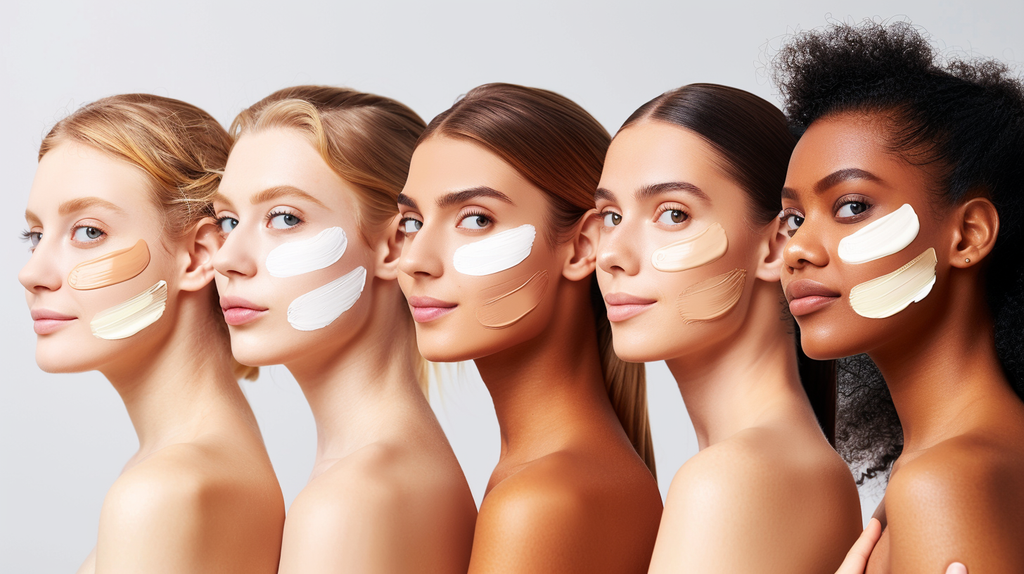2024's Essential Guide to Face Sunscreens: Daily SPF Heroes with Blue Light Defense
- Uncover the latest trends in facial SPF products.
- Explore the importance of blue light defense for skin health.
- Find your perfect sunscreen match for year-round protection.

Welcome to the future of skin care, where face sunscreens are not just about preventing sunburns but also safeguarding against the invisible threats of the digital age. As we step into 2024, the spotlight is on innovative SPF formulations that offer comprehensive protection, including defense against blue light emitted by our beloved screens. This guide will navigate you through the latest advancements in facial sunscreens, ensuring you're equipped with the knowledge to choose your daily SPF heroes.
Understanding SPF and Blue Light Defense
The Science of SPF
Sun Protection Factor (SPF) is a measure of how well a sunscreen can protect your skin from UVB rays, the primary cause of sunburn. However, it's crucial to choose a broad-spectrum sunscreen that also shields against UVA rays, which penetrate deeper into the skin, causing premature aging and increasing the risk of skin cancer. An SPF of 30 blocks about 97% of UVB rays, while SPF 50 blocks about 98%. It's important to note that no sunscreen can block 100% of UV rays, so reapplication and additional protective measures are essential.
The Impact of Blue Light on Skin
Recent studies have highlighted the potential skin damage caused by blue light exposure from electronic devices. Prolonged exposure can lead to premature aging, hyperpigmentation, and even a weakened skin barrier. The high-energy visible (HEV) light emitted by screens can penetrate deeper into the skin than UV rays, disrupting the skin's natural repair processes. Incorporating face sunscreens with blue light defense into your daily routine is essential for comprehensive skin protection.
Choosing the Right SPF
Selecting the appropriate SPF level depends on various factors, including your skin type, the intensity of sun exposure, and your daily activities. For everyday use, dermatologists recommend using a broad-spectrum sunscreen with at least SPF 30, reapplying every two hours for optimal protection. When choosing a sunscreen, look for labels that indicate "broad-spectrum" to ensure protection against both UVA and UVB rays. Additionally, consider your lifestyle and skin needs when selecting the texture and formulation of your sunscreen.

Trends in Facial Sunscreens for 2024
Lightweight Formulas
Gone are the days of thick, greasy sunscreens. The latest trend is lightweight, non-comedogenic formulas that provide high SPF protection without clogging pores or leaving a white cast. These formulations are perfect for daily use, even under makeup, as they blend seamlessly into the skin, offering a barely-there feel. Additionally, they're ideal for those with oily or acne-prone skin, as they help maintain a matte finish without contributing to excess shine or breakouts.
Tinted Sunscreens
Tinted face sunscreens are gaining popularity as they offer dual benefits: protection against harmful rays and a sheer coverage that evens out skin tone. Look for products with iron oxide, which provides added defense against blue light. These sunscreens are available in a range of shades to match different skin tones, making them a versatile addition to any skincare routine. They're perfect for those who want a hint of color while safeguarding their skin from the sun's damaging effects.
Eco-Friendly Options
With growing environmental concerns, eco-friendly face sunscreens are on the rise. These formulations are reef-safe, biodegradable, and free from harmful chemicals, making them a responsible choice for both your skin and the planet. Many brands are also focusing on sustainable packaging, using recyclable materials and reducing plastic waste. By choosing eco-friendly sunscreens, you're not only protecting your skin but also contributing to the preservation of our oceans and environment.
Incorporating Sunscreen into Your Daily Routine
Morning Application
A generous amount of face sunscreen as the final step in your morning skincare routine. Wait a few minutes for it to absorb before applying makeup, ensuring a smooth and protected base. It's important to cover all exposed areas, including the face, neck, and ears, for complete coverage. Applying sunscreen every morning, regardless of the weather or your plans, is essential for protecting your skin from the cumulative effects of sun exposure.
Reapplication Is Key
For continuous protection, especially if you're spending extended periods outdoors or in front of screens, reapply your sunscreen every two hours. Consider using a setting spray or powder with SPF for easy touch-ups throughout the day. Reapplication is crucial during peak sun hours, typically between 10 a.m. and 4 p.m., to maintain optimal protection. Keep a travel-sized sunscreen in your bag or at your desk for convenient reapplication.
Don't Forget Sensitive Areas
Areas like the under-eye, lips, and ears are often neglected but highly susceptible to sun damage. Use a targeted SPF product or a gentle formula suitable for sensitive skin to ensure these areas are adequately protected. Lip balms with SPF are available to shield the delicate skin of your lips, while mineral sunscreens are ideal for the sensitive under-eye area. Remember, consistent protection of these vulnerable areas can prevent premature aging and reduce the risk of skin cancer.

The Role of Antioxidants in Sunscreen
Combating Free Radicals
Antioxidants such as vitamins C and E, green tea extract, and ferulic acid play a crucial role in enhancing the efficacy of face sunscreens. They neutralize free radicals generated by UV and blue light exposure, reducing the risk of skin damage and aging. By scavenging these harmful molecules, antioxidants help prevent oxidative stress, a key factor in the development of wrinkles, fine lines, and hyperpigmentation.
Synergistic Effects
When combined with SPF, antioxidants provide a powerful defense against environmental aggressors. This synergistic effect enhances the protective capabilities of sunscreens, offering a more comprehensive shield against both immediate and long-term skin damage. Look for face sunscreens infused with antioxidants to boost your skin's resilience and promote a youthful, radiant complexion.
Incorporating Antioxidants into Your Regimen
In addition to using antioxidant-rich sunscreens, incorporate serums or moisturizers with these beneficial ingredients into your skincare routine for an added layer of protection. Applying an antioxidant serum before your sunscreen can amplify the protective benefits and provide a potent defense against environmental stressors. This approach ensures that your skin is fortified with a dual layer of defense, safeguarding against the harmful effects of both UV rays and pollution.
Navigating Sunscreen for Different Skin Types
Oily and Acne-Prone Skin
For those with oily or acne-prone skin, opt for oil-free, non-comedogenic face sunscreens that won't exacerbate breakouts. Gel or fluid textures are ideal, providing a matte finish without clogging pores. Look for formulas with ingredients like niacinamide or zinc oxide, which can help regulate oil production and soothe inflammation. Avoid sunscreens with heavy or greasy textures, as they can contribute to the formation of acne.
Dry and Sensitive Skin
If you have dry or sensitive skin, choose a hydrating and hypoallergenic sunscreen formula. Look for ingredients like hyaluronic acid, ceramides, and aloe vera, which provide moisture and soothe irritation. Mineral sunscreens containing zinc oxide or titanium dioxide are often gentler on sensitive skin compared to chemical sunscreens. Avoid formulas with alcohol or fragrances, as they can be drying or irritating.
Aging Skin
For aging skin, select a face sunscreen with added anti-aging benefits. Formulas containing peptides, retinol, or collagen can help reduce the appearance of fine lines and wrinkles while shielding your skin from the sun's harmful rays. Antioxidant-rich sunscreens can also provide additional protection against environmental damage that accelerates aging. Look for products with a creamy texture that can hydrate and plump the skin, enhancing its youthful appearance.

Conclusion
As we embrace the new era of sun protection, it's clear that face sunscreens are no longer a one-size-fits-all solution. The advancements in 2024 offer a range of options tailored to different skin types, concerns, and lifestyles. By understanding the importance of SPF and blue light defense, staying updated on trends, and incorporating sunscreen into your daily routine, you can safeguard your skin's health and beauty. Remember, your face sunscreen is your daily shield against the external world – choose it wisely, apply it generously, and wear it proudly.
Sources
- Schalka, S., & dos Reis, V. M. (2014). Sun protection factor: meaning and controversies. Anais Brasileiros de Dermatologia, 89(3), 464-469.
- Wang, S. Q., Balagula, Y., & Osterwalder, U. (2010). Photoprotection: a review of the current and future technologies. Dermatologic Therapy, 23(1), 31-47.
- Ghazi, S., & Couteau, C. (2019). Sunscreen application and its importance for the sun protection factor. Skin Research and Technology, 25(6), 802-807.
- Pinnell, S. R., Fairhurst, D., Gillies, R., Mitchnick, M. A., & Kollias, N. (2001). Microfine zinc oxide is a superior sunscreen ingredient to microfine titanium dioxide. Dermatologic Surgery, 27(4), 309-314.
- Kim, S. M., Oh, B. H., Lee, Y. W., Choe, Y. B., & Ahn, K. J. (2010). The relation between the amount of sunscreen applied and the sun protection factor in Asian skin. Journal of the American Academy of Dermatology, 62(2), 218-222.
DISCLAIMER
All the content on this blog, including medical opinion and any other health-related information, are solely to provide information only. Any information/statements on this blog are not intended to diagnose, treat, cure or prevent any disease, and should NOT be a substitute for health and medical advice that can be provided by your own physician/medical doctor. We at Nano Singapore, encourage you to consult a doctor before making any health or diet changes, especially any changes related to a specific diagnosis or condition.












